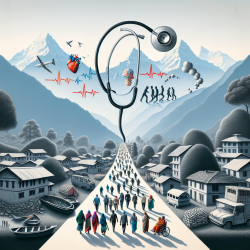The phenomenon of migration has been a subject of extensive research due to its profound implications on individuals and societies. A recent study titled "Study of Migration and Later Life Health in Nepal" provides critical insights into how migration experiences affect health outcomes in later life. This blog delves into the findings of this study and explores how practitioners can leverage this knowledge to improve their skills and encourage further research.
The Study at a Glance
The research conducted by Ghimire and Bhandari investigates the long-term consequences of migration on self-rated health and functional difficulty using data from the Chitwan Valley Family Study (CVFS) in Nepal. The study reveals a negative association between the number of years spent migrating and self-rated health, alongside a positive association with functional difficulties.
Key Findings
- Negative Health Outcomes: The study found that longer migration experiences correlate with poorer self-rated health and increased functional difficulties in later life.
- Gender Disparities: Women reported worse self-rated health compared to men, highlighting the need for gender-sensitive interventions.
- Educational Influence: Higher education levels were associated with better self-rated health, suggesting education as a protective factor against negative health outcomes.
Implications for Practitioners
The findings underscore the importance for practitioners to consider migration history when assessing the health of older adults. Here are some ways practitioners can apply these insights:
- Holistic Assessments: Incorporate questions about migration history into patient assessments to better understand potential long-term health impacts.
- Cultural Competency: Develop culturally sensitive care plans that address the unique challenges faced by migrants, especially women.
- Advocacy for Education: Support educational initiatives as they play a crucial role in mitigating negative health outcomes related to migration.
The Path Forward: Encouraging Further Research
This study highlights significant gaps in understanding the full impact of migration on health. Practitioners are encouraged to advocate for more comprehensive research that includes baseline health measures and considers socioeconomic factors over time. Such research could provide deeper insights into how migration affects long-term health and inform better policy-making.
The findings from this study are vital for scholars and policymakers dealing with rapid population aging and evolving family care systems. By understanding these dynamics, stakeholders can develop strategies that support healthier aging populations amidst changing social structures.










